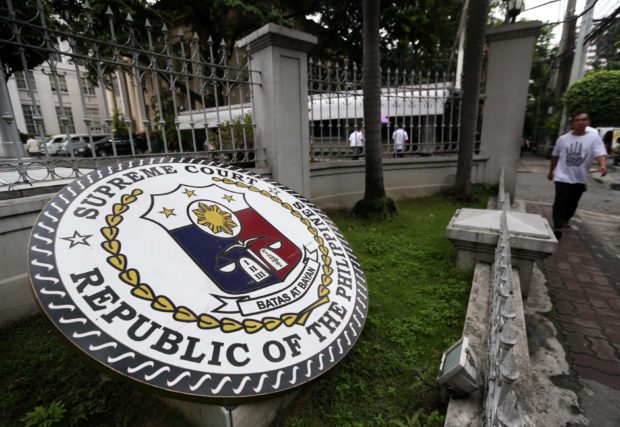
The Supreme Court symbol in Manila. (File photo LYN RILLON / Philippine Daily Inquirer)
MANILA, Philippines — The Supreme Court has upheld the ownership claim of four retired military officers over prime lots located within a former housing project for soldiers in Taguig City, which the Philippine Navy had developed as part of a golf course.
In ending the decades-long land dispute, the tribunal agreed with the previous rulings of retired Taguig Regional Trial Court Presiding Judge Toribio Ilao Jr. and the Court of Appeals that stopped the Navy and the Philippine Navy Golf Club Inc. (PNGCI) from continuing to take possession of the properties.
Voting unanimously, the high court’s First Division ordered the Navy and PNGCI to pay P5,000 in monthly rental fees to retired military officers Merardo Abaya, Angelito Maglonzo, Ruben Follosco and Elias Sta. Clara from the time the properties were separately awarded to them in 1996 and 1998, until they have turned over the lots to the rightful owners.
Contrary to the Navy’s claim, the magistrates said the contested properties, located inside the Armed Forces of the Philippines Officers’ Village in Fort Bonifacio, were already declared as alienable when these were awarded to Abaya et al. by the Department of Environment and Natural Resources.
The officers said the Navy cannot invoke the state’s immunity from suit in denying the former military officers’ rights to own the lands that they had acquired during a public auction.
“(T)he doctrine of state immunity is not absolute… Also, the doctrine may be shelved when its stubborn observance will lead to the subversion of the ends of justice,” read a portion of the high tribunal’s July 13 ruling, which was made public only on Oct. 21
“Here, the Philippine Navy cannot invoke the doctrine of state immunity considering that it has no valid reason to deprive Abaya et al. the enjoyment of the lands awarded to them,” it said.
“This court, as the staunch guardian of the citizens’ rights and welfare, cannot sanction an injustice so patent on its face,” it stressed.